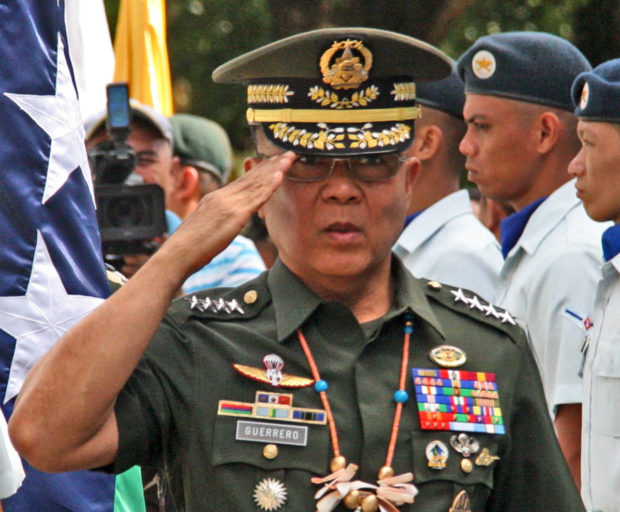
Gen. Rey Leonardo Guerrero (CDN PHOTO/JUNJIE MENDOZA)
It’s not yet goodbye for Gen. Rey Leonardo Guerrero, the Armed Forces of the Philippines chief of staff.
Guerrero, who took his oath before President Duterte on Wednesday, got a four-month extension of his term that was originally scheduled to end on Dec. 17, his 56th birthday.
His appointment was confirmed by the Commission on Appointments also on Wednesday.
6 months in service
Executive Secretary Salvador Medialdea signed Guerrero’s extension of service to April 24, 2018, according to presidential spokesperson Harry Roque.
The extension would give Guerrero a total of six months in service as AFP chief of staff.
The President appointed Guerrero as the 49th AFP chief of staff on Oct. 25, two months before he was supposed to retire.
Guerrero would continue to be the chief of staff as the AFP faces the government’s increasingly hostile ties with the Communist Party of the Philippines and the New
People’s Army, which Duterte had declared terrorist organizations.
There is also the imposition of martial law in Mindanao, which is scheduled to end on Dec. 31 but could be extended.
Duterte earlier said he would rely on the recommendation of the military when deciding whether to seek martial law’s extension from Congress.
Guerrero earlier said his priorities as AFP chief of staff included finishing off terrorist groups and neutralizing the communist rebels’ threat.
Before being named chief of staff, Guerrero served as commander of the Eastern Mindanao command based in Davao City, the President’s hometown.
He was also the commander of the Presidential Guard Battalion during the time of President Gloria Macapagal-Arroyo.
Revolving door
The extension of Guerrero’s term has revived the “revolving door policy” followed by previous administrations, raising the question anew whether there should be a law setting a fixed term for military chiefs.
Francisco Ashley Acedillo, a security analyst, noted that that while past Presidents had adopted the revolving door policy, Mr. Duterte appeared to be holding the record for having three AFP chiefs of staff less than two years into his presidency.
Before Guerrero, Duterte appointed Generals Ricardo Visaya and Eduardo Año, who both served as AFP chiefs of staff for six months.
Acedillo, a former Magdalo representative, said Guerrero’s term extension would not cause demoralization in the AFP “but it does raise the issue of the revolving door policy.”
“[O]n a policy level, without impugning the qualification and leadership capability of the chief of staff, the organization can benefit from stability of tenure and the sustainability of programs and policies,” Acedillo said.
In a statement, the AFP said Guerrero “is profoundly grateful to the President for the latter’s continued trust and confidence in his capability to lead the AFP.”
Revolutionary gov’t
Politically, the extension of Guerrero’s term bodes well as it is “contrary to our fears of censure” after Guerrero told Vice President Leni Robredo that the military would not support a revolutionary government, according to Acedillo.
The idea of declaring a revolutionary government was raised by President Duterte himself several times.
3-year fixed term
“Though this [extension] may be construed as a President’s prerogative, it says a
lot about the trust and confidence of the Commander in chief in the AFP under Guerrero’s stewardship,” security analyst Chester Cabalza said.
The extension of Guerrero’s term also reminded the security analysts of what now appears to be a need to have a law that would give a three-year fixed term for a military chief.
Former President Benigno Aquino III vetoed a bill that would have set a three-year term limit for the AFP chief of staff.
“If we keep on having this revolving door policy, how can we have a stable military policy?” Acedillo said.
National Security Adviser Hermogenes Esperon was the last military chief in recent history whose term was extended.
Esperon’s term was extended by three months in 2008 by then President Gloria Macapagal-Arroyo, citing the military’s gains against the communist insurgency.